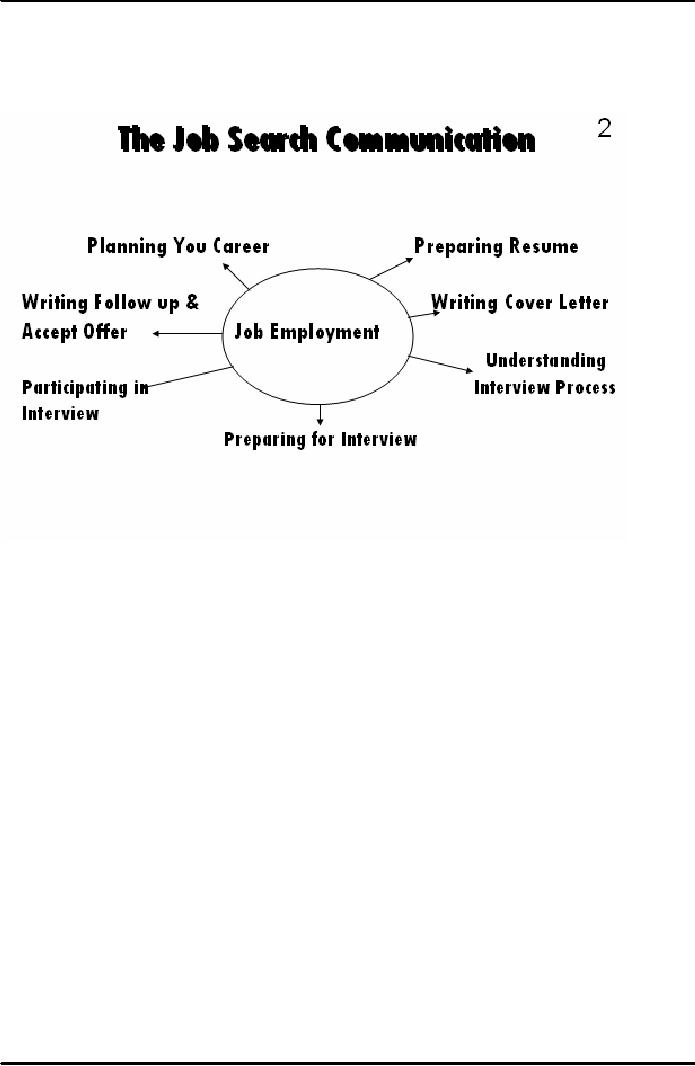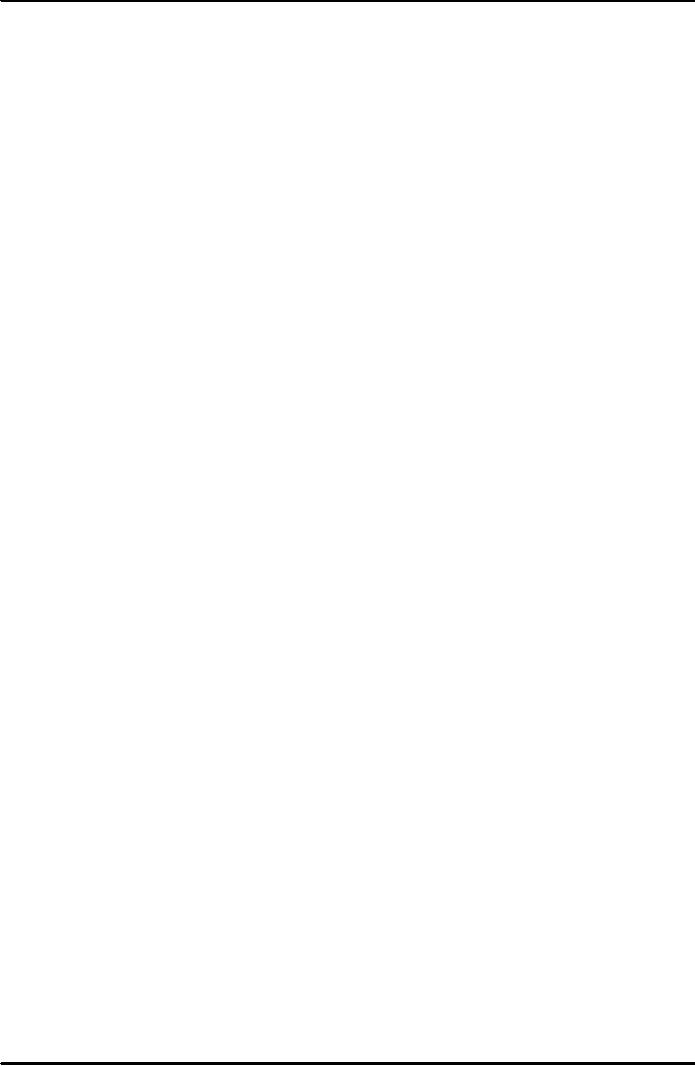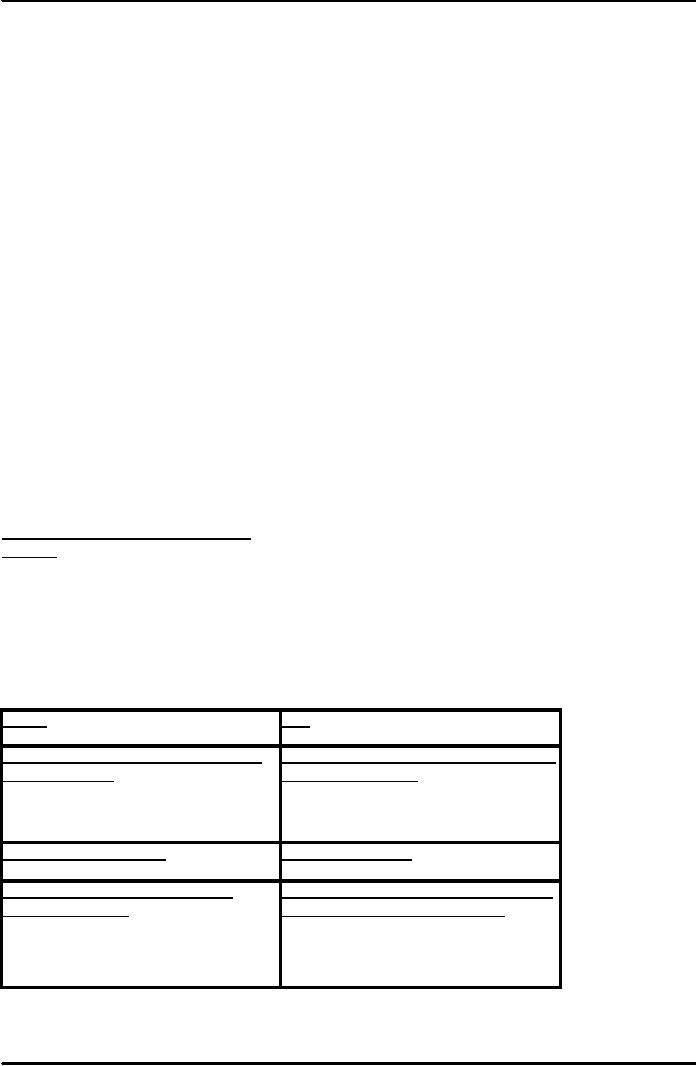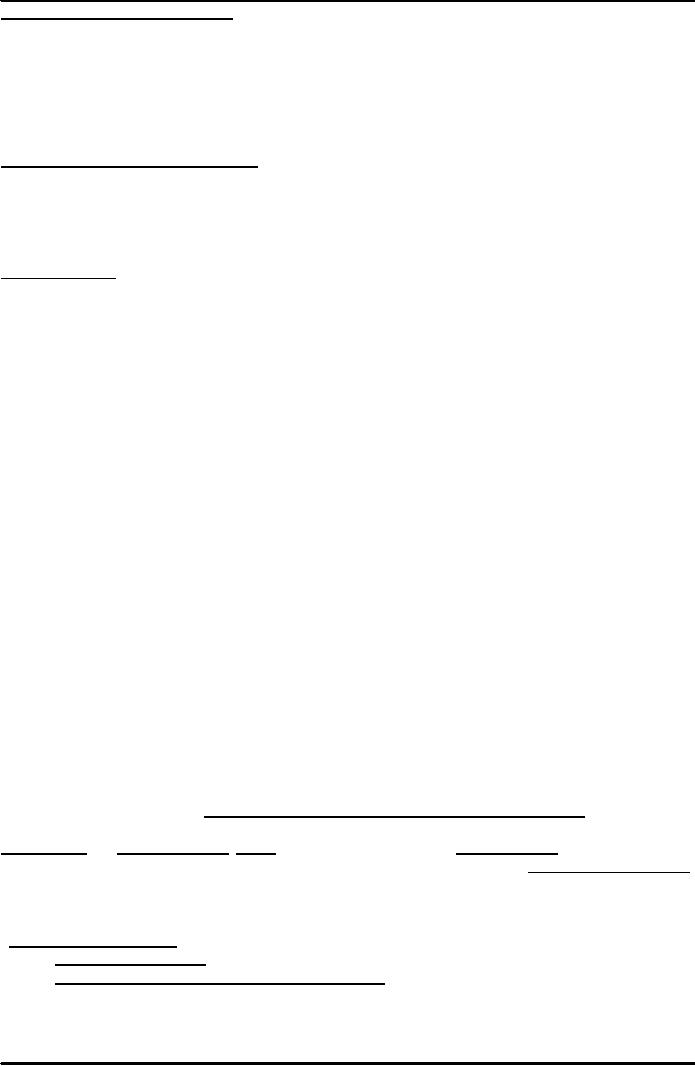 |
JOB SEARCH AND EMPLOYMENT:Planning Your Career |
| << MARKET REPORTS:Classification of Markets, Wholesale Market |
| RESUME WRITING:The Chronological Resume, The Combination Resume >> |

VU
Lesson
33
JOB
SEARCH AND EMPLOYMENT
The
Job Search
Communication
·
Understanding
Today's Changing
Workplace
·
Numerous
Forces are Changing
Work
place is today influence by numerous
forces such as globalization, advancing
technology
information
overload grown diversity team based
organizations certain other
issue such as corporate
downsizing
and cost-cutting initiatives growing
dependency on flexible employment
techniques such as
outsourcing
and increasing
entrepreneurism.
·
How
Changing workplace affect Job
Employment
is more flexible no lifelong
employees temporary worker & consultant on a
project
by
project basis. If we conduct survey
few people intend to hold the
save job for 5 yr self-employment
is
attractive
to more faremore
worker.
Hiring
Practices
·
What
Today's Employer Seek in job
Applicants
·
Employer
Seek Who
Can
adopt to new situation
Are
unafraid to change
Continue
to learn on the job
Are
sensitive to cultural differences
Planning
Your Career
·
Before
selling a product know what
that product is all
about
Setting
realistic objectives
·
You
one not expecting to be
managing a major corporation or earning
100,000/- Rs. similarly
not
expecting
to do some petty job this is a
phase of self-assessment
process.
148

VU
Know
your Major Strengths and
weaknesses
What
you have done at
school.
·
Good
with number.
·
Get
along with people
·
Gaps
in work history
·
In
experience
·
Over-qualification
·
Long
term employment with one
company
·
Job
termination
Establish
some goals
·
Long
& short term goals.
·
Picture
yourself as a successful person
Envision
the ideal day at
work
·
Talk
to people your envisioned profession
·
Read
out various occupation
·
Determine
your specific compensation
you expect
Envision
size of company & location
How
can you make yourself more
valuable to employers
·
Keep
an employment portfolio
·
Collect
anything that shows your
ability to perform
·
Take
interim assignment
·
Temporary
or freelance work
·
Work
on polishing and upgrading your
skill
·
Firm
networks of professional colleague & friends to be
kept up with occupation &
industry
Narrow
Down the Field
Let's
look at the functional areas of
business and their activities as
first step in narrowing the
field
Finances
Investment
bank, commercial banks savings
and loans corporation and
brokerage houses
Accounting
Public
account firms or work as controllers or financial
planners jobs range from
financial records
or
balance sheets to monitoring
business plans.
Marketing
& Sales
You
want to go for a company
that
Sell
Consumer product industrial
product, high-technology
Human
relations / personnel communication
Management
Information Systems.
Organizing
your Approach
·
Organize
your Approach to the Employment
Process
·
Find
out where the job
opportunities are
·
Which
industries are string
·
Which
part of the country are
booming
Stay
abreast of Business and Financial
News
·
Major
newspaper
·
Trade
magazine (print or line
edition)
Subscribe
to a major newspaper
Scan
business page/watch
television
149

VU
Research
Specific Companies
Make
a list of desirable employers
identify a promising industry
Learn
about Organization
Find
out if a company maintain
website
You'll
find information about org's
mission, products annual
report employee
benefits;
Respond
to Job Opening
Send
resumes quickly and cheaply
through e-mail and send
focused cover letters
directly to
executives
doing the hiring
Find
Career Counseling
College
placement offer individual
counseling on campus interview
job history
Analyze
your Purpose & Audience
·
Study
your purpose and your
audience to tailor your
message for maximum
effect.
·
Gather
relevant information about you
and the employer your are
targeting.
·
Establish
a good relationship by highlighting those
skills and qualifications that
match each
employer.
Writing
Resumes & Application
Letters
Preparing
Resumes
Send
your messages such as
resumes, application letters, job
inquiries, and follow-up
letter.
Sending
out such employment messages,
you have an opportunity to showcase
your
communication
skills skills valued highly by the
majority of employers. In fact, your
success in
finding
a job will depend on how carefully
you plan, write, and complete your
resume.
Analyze
your purpose and audience
A
resume is a structured, written
summary of a person's
education, employment background,
and
job qualifications. Resume is a form of
advertising. It is intended to stimulate an
employer's
interest
in your.
A
successful resume inspires
a prospective employer
to
invite you to interview with
the
company.
Thus, your purpose
to create interest
not
to tell readers everything about
you. In
fact, it
may
be best to only hint at some
things.
Fact
Fallacy
A
resume will kindle employer
interest and
Don't
think of a resume is to list
all your
skills
and abilities
generate
an interview
Get
you the job you want
Get
you in the
door
In
fact your resume probably
has less than
Read
carefully and thoroughly by an
interested
employer
45
seconds to make an
impression.
150

VU
Investigate
pertinent information
Include
pertinent personal history.
The specific dates, duties,
and accomplishments of any previous
jobs
you've
held. Collect every piece of relevant
educational experience that
adds to your qualifications, such
as
formal
degrees, skills, certificates,
academic awards, or
scholarships.
Information
about personal endeavors:
dates of your membership in an
association, offices you
may
have
held in a club or professional organization?
Presentations you might have
given to a community group.
Adapt
your resume to your Audience
Because
your resume will have
little time to make an impression, be
sure to adopt a "you"
attitude and think
about
your resume from the
employers perspective. Ask yourself:
What key qualifications will this
employer
be
looking for? Which of these
qualifications are your greatest
strengths? What
quality would set
you
apart
from other candidates in the
eyes of a potential employer. What
are three or four of
your
greatest
accomplishments, and what
resulted from these accomplishments?
A
Good Resume
A
good resume is a flexible
and can be customized for
various situations and
employers.
Seven
Qualities that Employer
Seek
1.
think in term of result
2.
know how to get things
done
3.
are well rounded,
4.
show signs of
progress
5.
have personal standards of
excellence
6.
are flexible and willing to
try new things
7.
possess strong communication
skills.
A
good resume is a flexible
and can be customized for
various situations and
employers.
Seven
Qualities that Employer
Seek
1.
think in term of result
2.
know how to get things
done
3.
are well rounded,
4.
show signs of
progress
5.
have personal standards of
excellence
6.
are flexible and willing to
try new things
7.
possess strong communication
skills.
Appropriate
Organizational Approach
To
focus attention on your
strongest points, adopt the appropriate organizational
approach make
your
resume chronological, functional, or a
combination of the two. The
"right" choice depends on
your
background
and your goals.
The
Chronological Resume
In
a chronological resume, the work-experience section
dominates, immediately after the name and
address
and
the objective. You develop this section by
listing your jobs
sequentially in reverse order,
beginning with
the
most recent position and
working backward toward
earlier jobs. Under each
listing, describe your
responsibility
and accomplishments, giving the
most space to the most
recent positions. If you're just
graduating
from college, you can vary
this chronological approach by putting
your educational qualifications
before
your experience, thereby focusing
attention on your academic
credentials.
The
chorological approach is the most common
way to organize a resume,
and many employers prefer
it.
This
approach has three key
advantages:
(1)
Employers are familiar with it &
can easily find
information
(2)
it highlights growth and
career progression
(3)
it highlights employment continuity and
stability
The
chronological approach is especially appropriate if
you have a strong employment history
and
are
aiming for a job that builds on
your current career path.
151
Table of Contents:
- COMMUNICATION:Definition of Communication, Communication & Global Market
- FLOW OF COMMUNICATION:Internal Communication, External Communication
- THEORIES OF COMMUNICATION:Electronic Theory, Rhetorical Theory
- THE PROCESS OF COMMUNICATION & MISCOMMUNICATION:Message
- BARRIERS IN EFFECTIVE COMMUNICATION /COMMUNICATION FALLOFF
- NON- VERBAL COMMUNICATION:Analysing Nonverbal Communication
- NON- VERBAL COMMUNICATION:Environmental Factors
- TRAITS OF GOOD COMMUNICATORS:Careful Creation of the Message
- PRINCIPLES OF BUSINESS COMMUNICATION:Clarity
- CORRECTNESS:Conciseness, Conciseness Checklist, Correct words
- CONSIDERATION:Completeness
- INTERCULTURAL COMMUNICATION
- INTERCULTURAL COMMUNICATION:Education, Law and Regulations, Economics
- INDIVIDUAL CULTURAL VARIABLES:Acceptable Dress, Manners
- PROCESS OF PREPARING EFFECTIVE BUSINESS MESSAGES
- Composing the Messages:THE APPEARANCE AND DESIGN OF BUSINESS MESSAGES
- THE APPEARANCE AND DESIGN OF BUSINESS MESSAGES:Punctuation Styles
- COMMUNICATING THROUGH TECHNOLOGY:Email Etiquette, Electronic Media
- BASIC ORGANIZATIONAL PLANS:Writing Goodwill Letters
- LETTER WRITING:Direct Requests, Inquiries and General Requests
- LETTER WRITING:Replies to Inquiries, Model Letters
- LETTER WRITING:Placing Orders, Give the Information in a Clear Format
- LETTER WRITING:Claim and Adjustment Requests, Warm, Courteous Close
- LETTER WRITING:When The Buyer Is At Fault, Writing Credit Letters
- LETTER WRITING:Collection Letters, Collection Letter Series
- LETTER WRITING:Sales Letters, Know your Buyer, Prepare a List of Buyers
- MEMORANDUM & CIRCULAR:Purpose of Memo, Tone of Memorandums
- MINUTES OF THE MEETING:Committee Members’ Roles, Producing the Minutes
- BUSINESS REPORTS:A Model Report, Definition, Purpose of report
- BUSINESS REPORTS:Main Features of the Report, INTRODUCTION
- BUSINESS REPORTS:Prefatory Parts, Place of Title Page Items
- MARKET REPORTS:Classification of Markets, Wholesale Market
- JOB SEARCH AND EMPLOYMENT:Planning Your Career
- RESUME WRITING:The Chronological Resume, The Combination Resume
- RESUME & APPLICATION LETTER:Personal Details, Two Types of Job Letters
- JOB INQUIRY LETTER AND INTERVIEW:Understanding the Interview Process
- PROCESS OF PREPARING THE INTERVIEW:Planning for a Successful Interview
- ORAL PRESENTATION:Planning Oral Presentation, To Motivate
- ORAL PRESENTATION:Overcoming anxiety, Body Language
- LANGUAGE PRACTICE AND NEGOTIATION SKILLS:Psychological barriers
- NEGOTIATION AND LISTENING:Gather information that helps you
- THESIS WRITING AND PRESENTATION:Write down your ideas
- THESIS WRITING AND PRESENTATION:Sections of a Thesis (Format)
- RESEARCH METHODOLOGY:Studies Primarily Qualitative in Nature
- RESEARCH METHODOLOGY:Basic Rules, Basic Form, Basic Format for Books